AFL clubs confident hubs won’t be needed as they prepare for possible mid-June restart
AFL clubs are confident there will be no need to go into hubs to restart the season but exactly when will that be? Here’s everything you need to know about every aspect of footy, including AFLW.
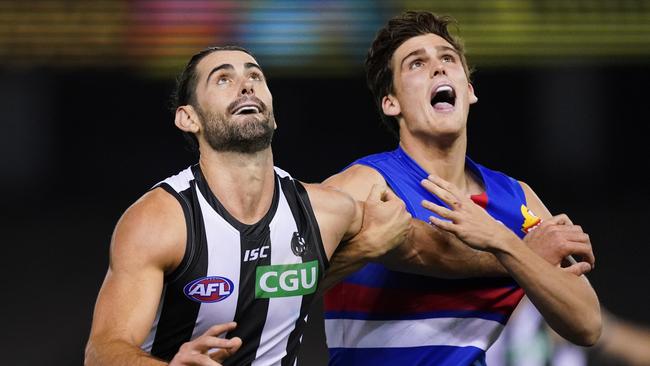
Sport
Don't miss out on the headlines from Sport. Followed categories will be added to My News.
The AFL’s 18 clubs are ramping up their training for an imminent pre-season return, confident $40 million hubs will not be needed to restart the 2020 season.
But West Australian clubs could already be at a disadvantage to rival clubs because of tighter border controls, with the state government mandating players returning to the state must quarantine for 14 days.
Hawthorn has summoned its players back from interstate and expects to have them in Melbourne by week’s end ahead of potential training for groups of 6-10 players next Monday.
Brisbane has told its players to immediately start increasing the intensity of training sessions as clubs anticipate the start of another pre-season in coming weeks.
But West Coast head of football Craig Vozzo confirmed to the Herald Sun the current advice was that players needed to quarantine for 14 days from the date of their return to Perth.
The club is hoping to have all their players back by the end of this week, but that timeline would mean those players cannot join group training for three more weeks unless the policy changes.
Relive classic AFL matches from the 60s to today on KAYO SPORTS. New to Kayo? Get your 14-day free trial & start streaming instantly~
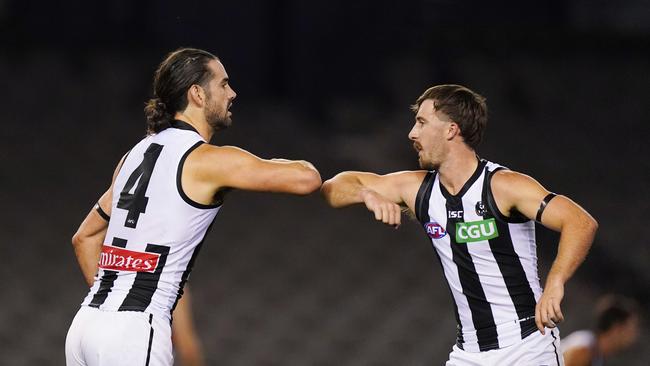
Players already in Perth are unable to train together in groups of 10 under AFL rules despite the state relaxing social distancing rules to allow gatherings of ten people.
The Lions have 27 interstate players, with Brisbane head of football David Noble revealing tonight their players did not need a 14-day quarantine period under that state’s regulations.
As AFL chief executive Gillon McLachlan flagged a critical day for footy next Friday when the national cabinet meets for the second time this week, the league’s hubs are clearly dead in the water.
There is genuine optimism of a mid-June return to football, with a no-hub return saving the league $40 million and giving 250 footballers a footy lifeline given there was no space for them in hubs.
Noble said clubs were confident they could fly in and fly out of states, after Queensland premier Annastacia Palaszczuk offered special exemptions to NRL teams to fly into NSW for games starting May 28.
“I think we will be able to (play that way). Don’t think for one minute we should frown upon the AFL looking at every aspect of this because they knew the difficulties that came with (a restart). We needed to make sure we had the capacity to restart the season but with the way the community has handled it we might be able to play sooner. The fly-in, fly-out mechanism is feasible.”
“We would be wanting them to train with more intensity. They are going well now and have an idea of the times (they need to set) but they will step up from pairs to small groups to team training to match simulation and it’s just the timeline of that we need to work through from stage B to stage C.”
He hopes clubs would resume the season “anywhere between mid-June to the end of June.”
Victorian footballers are also able to skip 14-day quarantines but concerns remain about whether WA, with tighter quarantine measures, might still need two weeks of self-isolation before they can train in small groups.
North Melbourne footy boss Brady Rawlings said North’s contingent was expected to return to Melbourne “in the next couple of days”. Carlton will speak to its players today about the next steps.
Hawthorn is relatively well placed with the bulk of its squad already in Victoria aside from gun midfielder Jaeger O’Meara (Western Australia) and top draft pick Will Day (South Australia). Football boss Graham Wright said the club had asked its players to return to Melbourne from interstate or rural areas over the next three to five days.
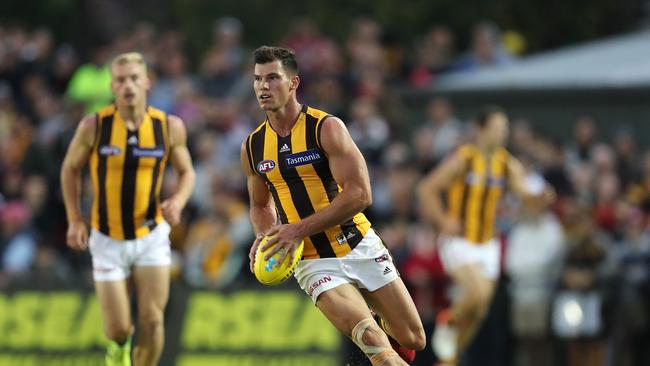
“Over the last week or so we have felt that our players should be back by the middle part or end of the week,” Wright said.
“We haven’t got too many away though. It is much tougher for Freo and West Coast who have got a lot of players (interstate) and they have got to go into quarantine.
“We have only got half a dozen players interstate. Primarily our guys are in and around Melbourne. We are not in a difficult position from that perspective.
“Coming back into Victoria because there are no (isolation period) restrictions or anything.
“All the Victorian clubs from that perspective, and Sydney is the same, have probably got that a bit easier.
“So we are hoping to have everyone back here by the end of the week.”
MORE AFL NEWS:
AFL greatest team of the decade: You decide the best team since 2010
The Tackle: We miss so much about footy but what we miss most is connection to each other
WHEN WILL AFL BE BACK? EVERYTHING YOU NEED TO KNOW
When will AFL restart?
Mid-June is considered most likely but it could be delayed until July depending on negotiations with the ultra-cautious Andrews Government and other states. The AFL must get the green light from five different state health authorities.
Why will it take longer than the NRL to resume?
Pies boss Eddie McGuire claimed it was because the AFL has endeavoured to display “social leadership” and to be “model citizens … they don’t want to be out like the NRL spruiking different ideas”. But the NRL, which restarts on May 28, has been more ambitious under the leadership of enterprising chairman Peter V’landys.
Matches:
17 rounds (every team plays each other once) and a traditional four-week finals series. Depending on when the season resumes, games could be played most days of the week. Round 1 results count.
Hubs:
Players and staff from all 18 clubs could be stationed in quarantined hubs in as many as three locations across the country to ensure they are shielded from the virus but the preference and firming option is for a fly in, fly out model.
Game changes:
Quarters reduced to 16-minutes plus time-on. The AFL told the players last Tuesday to prepare for four-day breaks between matches. Extended interchange and unlimited rotations have also been mooted.
Crowds:
The majority, if not all the season, will be played without crowds unless the AFL considers an offer from NT where crowds are permitted.
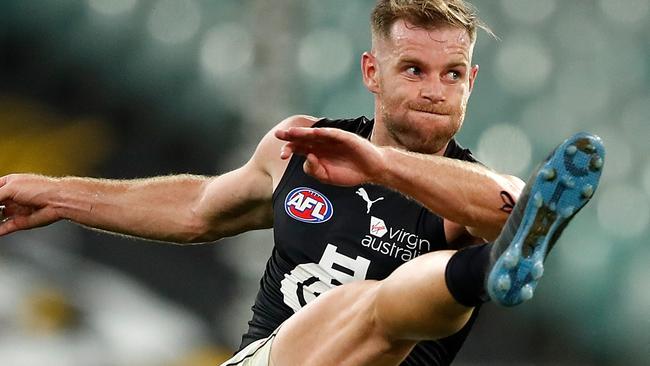
Grand Final:
It won’t be on the last Saturday in September. The AFL has said it is prepared to play the season until December 31 if it has to, but a target of finishing the season by Saturday, October 31 has been set – which just happens to be one of the biggest days in Australian racing, Derby Day. The AFL ruled out a twilight or night Grand Final earlier this year, but it could yet eventuate.
TV and radio coverage:
Adelaide’s Rory Sloane has suggested players could be hooked up to mics with more pre-game and midgame interviews. Channel 7 has already announced plans to incorporate fake crowd noise into the broadcast – and potentially into venues – to overcome the depressingly bleak Round 1 experience played in front of empty stands. TV and radio commentators will cover matches from remote studios.
Draft:
Despite the prospect of no elite under-18s competition – or state leagues – this season, the league will push ahead with its national draft.
Tasmania:
The Apple Isle’s long-term dream of having a standalone club has taken a massive hit, while Hawthorn and North Melbourne’s lucrative contract to play games in Launceston and Hobart this year are in jeopardy.
AFLW:
The league has declared AFLW will definitely be back next year, but it remains to be seen what sort of impact the financial squeeze will have on the product. There is concern among clubs that the lack of VFL Women’s competition could see the standard dip and development of players hampered. Clubs seeking admission to AFLW are uncertain if it will delay their entry in any expansion plans.
SEASON 2021 AND BEYOND
Footy fans have been warned to brace for the game to emerge in a vastly different form once the coronavirus crisis passes, both on and off-field.
Teams:
Rarely-sighted AFL chairman Richard Goyder released a statement vowing all 18 clubs will survive the crisis including the two costly expansion clubs Gold Coast and Greater Western Sydney as well as the most financially stricken teams such as St Kilda and Brisbane Lions.
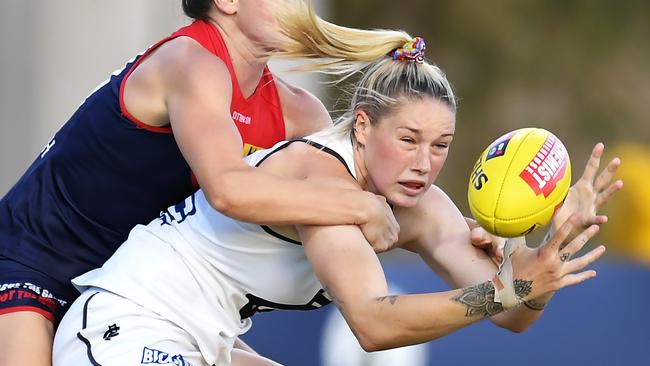
Matches:
2021 will almost certainly revert back to 22 matches over 23 rounds with each club having one mid-season bye. The AFL is exploring replicating the 2020 fixture in 2021 to both save the extra workload of producing a new fixture and to allow clubs to stage blockbuster and home games that had been earned and planned for.
Game changes:
Significantly reduced game time, potentially the same 16-minute quarters used this year, could become permanent, despite widespread opposition and fears the league is meddling too much with the fabric of the game. List sizes will also be severely cut.
Crowds:
The AFL expects crowds to be back at the football from Round 1 of next season.
Grand Final:
The AFL ruled out a twilight or night Grand Final earlier this year, but it could yet eventuate. If it happens, it would be difficult to put the genie back into the bottle. But it is locked in at the MCG until 2057.
TV and radio coverage:
The AFL has already been in preliminary discussions with its broadcast partners to extend the current deal by two more years until the end of 2024. Despite mass staff stand downs across the industry, AFL Media, the league-controlled “news” service, remains up and running.
Trade:
A mid-year trade window has long been mooted, but the reduction in list sizes in the coming years could impact on that.
Tasmania:
Negotiations on a new deal for Hawthorn to play games in Launceston have been put on hold until the end of the year, and potentially longer. The $19 million five-year deal runs out at the end of next year.
AFLW:
The expansion of AFLW to an 18-team women’s competition – forecast by 2024 – could be delayed. Before the pandemic, the AFL would look to include two new teams in 2022 and two more in 2024, but Hawthorn, Essendon, Sydney and Port Adelaide may be forced to wait.
Originally published as AFL clubs confident hubs won’t be needed as they prepare for possible mid-June restart


